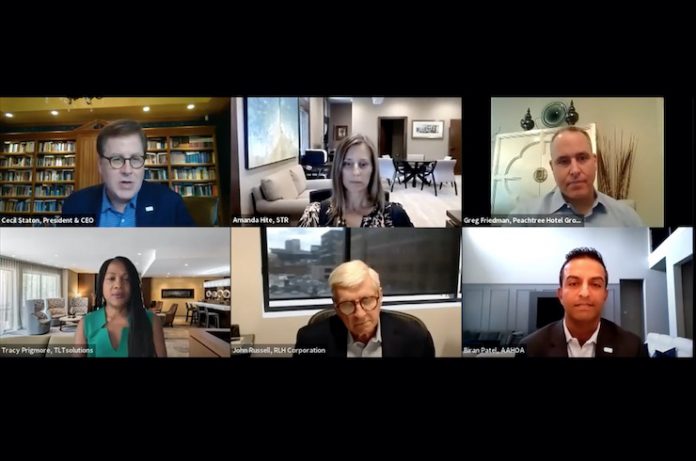
The Americas Lodging Investment Summer (ALIS) announced earlier this month that its ALIS Summer Update series—three events slated to take place between July 13-20 in New York, Nashville, and Dallas—would pivot to be held virtually. Each event’s program included panels where experts and leaders discussed the state of the industry, hotel development, financing, and more amid the COVID-19 pandemic.
The ALIS Summer Update Nashville panel took place on July 16 and featured panelists Greg Friedman, CEO of Peachtree Hotel Group; Amanda Hite, president of STR; Biran Patel, chairman of the Asian American Hotel Owners Association (AAHOA); Tracy Prigmore, managing partner at TLTSolutions; and John Russell, CEO at RLH Corporation. Following introductions by Jeff Higley, president of The BHN Group, and Chip Rogers, president and CEO of the American Hotel and Lodging Association (AHLA), the virtual panel, moderated by Cecil Staton, president and CEO of AAHOA, began with discussions of how hotels will look and feel once reopened.
“There is no perfect playbook to lead in a pandemic… There’s going to be light at the end of the tunnel, but we must keep realistic,” said Friedman, adding that guest expectations when they return to hotels will be greater and different from before. It is the hotelier’s job, he said, to meet these increased demands.
Whether these are permanent or temporary shifts, Patel felt that though many changes are imminent, they shouldn’t fundamentally change the hotel experience too much and should be implemented with cost implications in mind.
Discussing these changes, Patel and Russel mentioned a range of alterations to existing amenities—e.g., fewer in-person services in guestrooms, less frequent housekeeping, no valet parking—and suggested the industry would see increased grab-and-go amenities, greater use of outdoor spaces, F&B and meetings outside, more self-serve options, and wider adoption of mobile check-in and contactless communication.
“Remember that things are changing daily—be prepared to accommodate for those changes,” said Patel. Hite added, “You can overwhelm yourself with the uncertainty you’re living in.”
In terms of the tactical implementation of these modifications, Russel predicted that guests will be open to changes and will appreciate knowing hoteliers want to keep them safe.
Prigmore shared the sentiment, “Never waste a good crisis.” Rather than feeling discouraged by the pandemic, she suggested executives think about how this can be a learning experience, as people figure out how to communicate and educate better with and from one another. Instead of focusing on the losses, she encouraged everyone to focus on what’s going to come out of this crisis and how it has brought people closer together.
Friedman stressed the importance of honest, frequent, open communication with teams throughout the crisis and going forward. While these ideals are always important, they are even more crucial in times of uncertainty. Being transparent with employees will also translate to guests as they begin to come through the doors once again.
Panelists agreed that instilling confidence in guests to get back on the road starts with powerful leadership at the top.
“I like to lead from the heart, and then the head. First I want to think about what others need, and then expand from there… I feel resilient and resourceful in the short-term. We’re going to keep forging forward,” said Prigmore.











